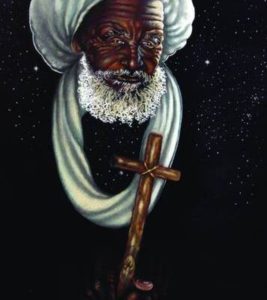
In today’s first reading we see a phrase that could be controversial these days. “Symeon who was called Niger.” It is believed that Symeon was an African Gentile who converted to the Way and was journeying with the new formed Christians spreading the Gospel. Why is this significant? One, it shows there are no racial boundaries to Christianity in the early Church. That reminds us that today there should be none either. Skin color, ethnic origin, (or any other adverb to describe someone) does not stop conversion. Secondly, it reminds that by virtue of our baptism, and reminded to us with Confirmation, we too have been given a name change.
Name changes in Scripture mean something has happened. Abram became Abraham. Joseph became Barsabas. Saul became Paul. Simon became Peter. Baptism isn’t just a symbol. It is a change. Regardless of what age you are baptized, if it is done with the right form and intention, it has changed you. That is why we confession with the entire church the words “I believe in one baptism for the forgiveness of sins.” (As declared by the early church in 325 A.D. – Nicene Creed) We die with Christ and rise with him again. We are made new. Our stoney hearts turned to living ones. Each of us is called by the Holy Spirit to live up to that new name, just as Barnabas and Paul were chosen from the list of men to go out to do the specific work with the Gentiles.
Which brings me to my last thought this morning: we are the salt of the earth and the light of the world. Just as the name Joseph meant someone who brings people out of bondage and Barnabas means son of consolation or exhortation; part of the meaning of your new name is to be salt and light. In the office of readings this morning for the memorial of Saint Barnabas it says:
“You are the light of the world. A city set on a hill cannot be hidden. Nor do men light a lamp only to put it under a bushel basket; they put it on a stand where it gives light to all in the house. The Lord called his disciples the salt of the earth because they seasoned with heavenly wisdom the hearts of men rendered insipid by the devil. Now he calls them the light of the world as well, because they have been enlightened by him, the true and everlasting light, and have themselves become a light in the darkness.” (From a treatise on the Gospel of Saint Matthew by Saint Chromatius, bishop).
Think about that for a minute. Are your actions “seasoning with heavenly wisdom the” hearts of those around you? Do you live as if you are a “light in the darkness”? That is what we can learn from Saint Barnabas. To accept our new name, and our calling.
A reflection on the readings for June 11, 2019: The Memorial of Saint Barnabas, Apostle
